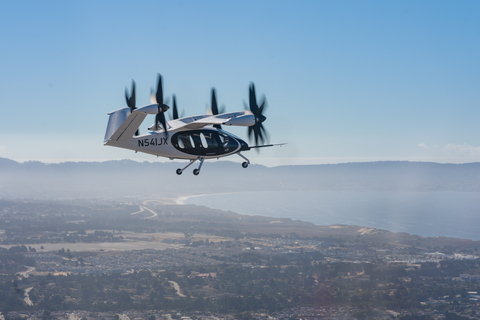SANTA CRUZ, Calif.--(BUSINESS WIRE)--Joby Aviation, Inc. (NYSE:JOBY), a company developing electric air taxis for commercial passenger service, today announced it is hosting aviation regulators from around the world at the Company’s manufacturing and flight testing facilities in Marina, California, as part of ongoing international certification efforts.
The week-long session, known as a “technology familiarization,” is a formal part of the process of validating an aircraft’s type design for use in international markets. During the session, regulators from three countries, each of which have existing bilateral aviation safety agreements with the U.S. Federal Aviation Administration (“FAA”), engage with Joby team members and technology, as well as FAA staff, to support the continued harmonization of certification approaches for electric air taxis like the Joby aircraft around the world.
Attendees include personnel from the U.K. Civil Aviation Authority, Japan Civil Aviation Bureau, and Australia’s Civil Aviation Safety Authority, all of which represent nations where Joby has applied for validation of its FAA type certificate, once received. The validating regulators engage with Joby and FAA teams on the certification approach being taken in novel technology areas as well as observe ongoing flight tests and system-level testing.
Didier Papadopoulos, President of Aircraft OEM at Joby, commented: “By hosting regulators from key markets around the world, we have the opportunity to share the industry-leading work we continue to do with the FAA.”
“From the U.K. to Japan and Australia, Joby is working with forward-leaning nations to ensure alignment on safety and certification efforts that will enable the deployment of quiet, emissions-free aircraft in cities and communities around the world soon after we complete certification here in the US.”
Joby’s global certification strategy leverages existing bilateral aviation safety agreements between the FAA and dozens of nations around the world, including the U.K., Japan, and Australia.
In addition to this work, in South Korea, Joby continues to engage with the Ministry of Land, Infrastructure, and Transport and plans to participate in the country’s K-UAM Grand Challenge. Joby also continues to engage with regulatory authorities from other markets, including the UAE’s General Civil Aviation Authority and the European Union Aviation Safety Agency.
This week, the FAA published new rules for air taxi pilot training and operations in the US, calling it “the final piece of the puzzle for safely introducing these aircraft in the near term.”
In February 2024, Joby announced it had become the first electric air taxi developer to complete the third of five stages of the FAA type certification process, and, as of August 2024, the Company had completed more than one-third of its work for the fourth stage. Joby provides updates on its certification progress in each of the Company’s quarterly Shareholder Letters.
Joby’s electric air taxi is designed to carry a pilot and four passengers at speeds of up to 200 mph, offering high-speed mobility with a fraction of the noise produced by helicopters and zero operating emissions.
About Joby
Joby Aviation, Inc. (NYSE:JOBY) is a California-based transportation company developing an all-electric, vertical take-off and landing air taxi which it intends to operate as part of a fast, quiet, and convenient service in cities around the world. To learn more, visit www.jobyaviation.com.
Forward Looking Statements
This press release contains “forward-looking statements” within the meaning of the “safe harbor” provisions of the Private Securities Litigation Reform Act of 1995, including but not limited to, statements regarding the development and performance of our aircraft, the growth of our manufacturing capabilities, our regulatory outlook, progress and timing; our business plan, objectives, goals and market opportunity; our plans related to certification and operation of our aircraft in foreign markets; and our current expectations relating to our business, financial condition, results of operations, prospects, capital needs and growth of our operations, including the expected benefits of our vertically-integrated business model. You can identify forward-looking statements by the fact that they do not relate strictly to historical or current facts. These statements may include words such as “anticipate”, “estimate”, “expect”, “project”, “plan”, “intend”, “believe”, “may”, “will”, “should”, “can have”, “likely” and other words and terms of similar meaning in connection with any discussion of the timing or nature of future operating or financial performance or other events. All forward looking statements are subject to risks and uncertainties that may cause actual results to differ materially, including: our ability to launch our air taxi service and the growth of the urban air mobility market generally; our ability to produce aircraft that meet our performance expectations in the volumes and on the timelines that we project; complexities related to obtaining certification and operating in foreign markets; the competitive environment in which we operate; our future capital needs; our ability to adequately protect and enforce our intellectual property rights; our ability to effectively respond to evolving regulations and standards relating to our aircraft; our reliance on third-party suppliers and service partners; uncertainties related to our estimates of the size of the market for our service and future revenue opportunities; and other important factors discussed in the section titled “Risk Factors” in our Annual Report on Form 10-K, filed with the Securities and Exchange Commission (the “SEC”) on February 27, 2024, and in future filings and other reports we file with or furnish to the SEC. Any such forward-looking statements represent management’s estimates and beliefs as of the date of this release. While we may elect to update such forward-looking statements at some point in the future, we disclaim any obligation to do so, even if subsequent events cause our views to change.




